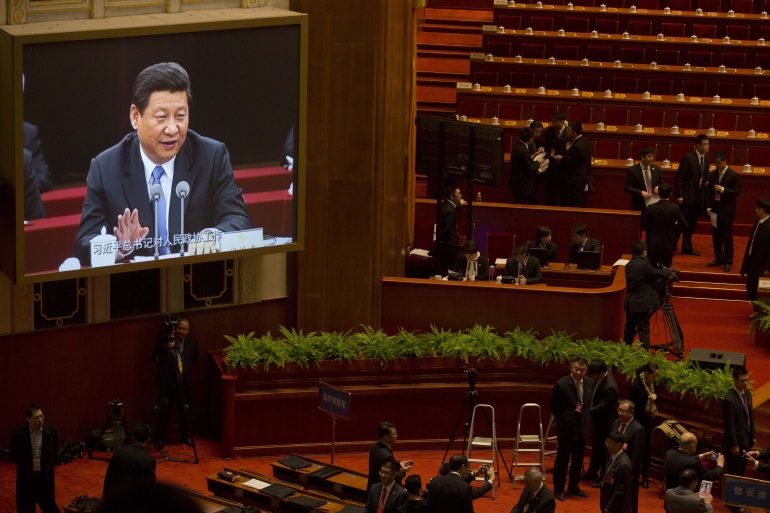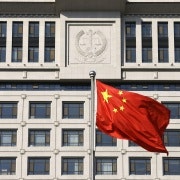All stand for Beijing's one-man show

A giant display shows an image of Chinese President Xi Jinping before the opening session of the Chinese People's Political Consultative Conference in Beijing's Great Hall of the People, China, Monday, March 3, 2014. (AP Photo/Ng Han Guan)
On March 5, the world’s biggest speed-networking event opens in Beijing. The annual “twin sessions” brings together all provincial leaders with their national-level colleagues to rubber stamp the Communist Party’s decisions on policies ranging from economic management and reform, to social polices and the environment, foreign policy, and just about everything else.
But like all conferences, the real action takes place outside the formal meetings. The hottest topic among delegates in the crammed hotel lobbies, restaurants and foot-massage parlours -- one that will not be on the meeting’s agenda -- is how China’s President has emphatically consolidated power over the past year since his first National People’s Conference (NPC).
As a member of one of the inner circle said privately, “how did [Xi] manage to conceal himself for 30 years and seem so ordinary?” It is as if Xi practiced Deng Xiaoping’s maxim to “hide your strength, bide your time”.
Since last year’s NPC, Xi has overseen the handing down of a life-term prison sentence for his one-time political rival, Bo Xilai. He has severed the power base of former Standing Committee member and head of internal security, Zhou Yongkang, pursuing many associates including Zhou’s own son. Rumours are rife that Zhou either has been, or is about to be, expelled from the Communist Party – a prelude to charges being laid, a trial being held, and inevitable punishment.
Xi has vigorously pursued the anti-corruption campaign at all levels across the country. His early campaign to “catch tigers” as well as “swat flies” was met with widespread cynicism. Now there is no doubt. In addition to Zhou Yongkang’s associates, Xi has netted other tigers in his anti-corruption campaign, including numerous senior provincial-level officials. The roll call of those caught in the anti-corruption campaign is bound to make for interesting chatter among the NPC delegates.
To consolidate power, Xi has tacked to the conservative side of politics by adopting a more muscular foreign policy stance, cracking down on commentary on social networking sites critical of the Party and its members’ abuse of privilege and power, and intimidating “rights lawyers” and academics who argue for the rule of law. At the same time, Xi is pushing forward with a busy, market-oriented, economic agenda as set down at last year’s Third Party Plenary Session.
In a country without independent media and opinion polling -- and where officials must, especially now, toe the Party’s line -- it is nearly impossible to gauge public opinion. Nonetheless, a sense seems to be widely shared that the new leadership is on the right track. Things could not have been left to run on as they were and Xi brings a sense of policy activism which is welcome, even if people sensibly wonder where it might all end.
Inside the meeting, delegates will discuss and then vote on policies that have largely been decided by the leadership. Much attention, as in previous years, will be on the economy. A growth target will be reaffirmed, which is likely to be that contained in the current Five-Year Plan of 7.5 per cent. More interestingly will be what is said about how to implement the economic reform agenda set down in the Third Plenum document. Hot topics here will be how to move forward with reform of the financial system, especially banking, opening the capital account further, and increasing RMB usage in international trade settlements.
One worrying issue for delegates will be the growth of the shadow-banking sector, especially the participation of state-owned banks through wealth management products, and other derivatives. This is largely unregulated and although the absolute size is probably much less than some alarmist commentary would suggest, it has grown rapidly, albeit from a tiny base. Rapid build-up in municipal government debt may also be keeping delegates awake at night. We can expect some policy initiatives to address concerns in these areas.
The environment – specifically air pollution – is one area where discussions may stray from the script. Delegates last year squinted out of their hotel windows to try and discern through dense smog what was on the other side of the street. In the past week, Beijing’s pollution reading has regularly reached “hazardous” levels. The Government is increasingly concerned about growing popular resentment that much is said but little seems to be done to fix the problem.
Foreign policy is also likely to command greater attention than in recent years. The heightened tensions with Japan over the disputed islands alone would ensure that nationalism at the meetings is at the fore, but to that can be added the South China Sea and a sense in Beijing that the international settings are starting to change more quickly - and in ways that may be to China’s advantage. Xi’s more assertive foreign policy will be strongly supported.
Delegates will be keen to express views on social policies, ranging from health care and insurance, aged pensions, urbanisation and reform of the hukou system, population policy, income inequality, escalating cost of housing, food self-sufficiency and rural land reform. The policies to address these issues are all set out in the Third Plenum document. What will need watching are the concrete measures that emerge to begin implementing them.
In recent years, carefully managed policy debates have been encouraged, in part as a valve for disaffection as well as to create the impression that the NPC is more than a rubber-stamp parliament. But this year’s meeting will ultimately be all about Xi Jinping: his consolidation of power; the reach of the austerity and anti-corruption campaigns; and his capacity to push through much needed economic reforms. Some are beginning to fear, however, that perhaps too much now depends on just one man.
Geoff Raby is Chairman and CEO of Beijing-based advisory firm Geoff Raby & Associates, and a former Australian Ambassador to China.
















